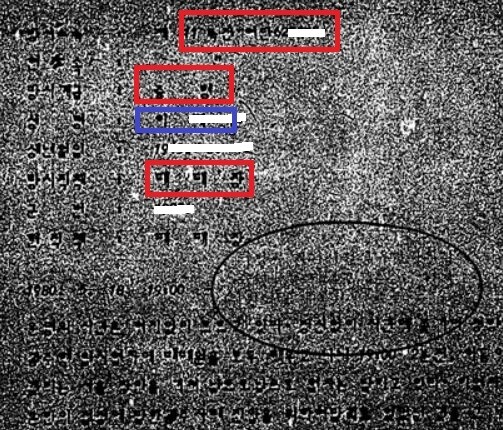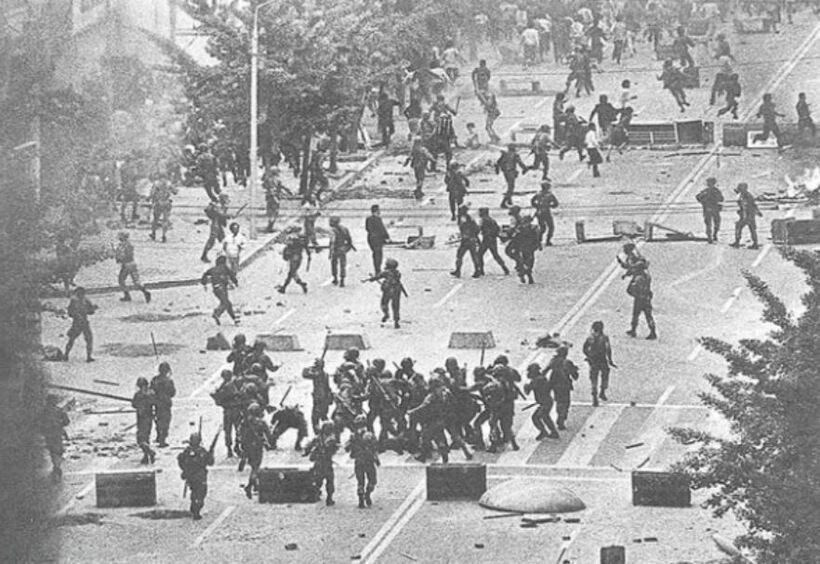hankyoreh
Links to other country sites 다른 나라 사이트 링크
An airborne battalion commander kept record of first shooting during Gwangju Democratization Movement

An airborne battalion commander’s record of indiscriminate shooting by martial law forces during the events of the May 1980 Gwangju Democratization Movement has been uncovered for the first time. Many are insisting that an investigation commission should be quickly established to identify who issued the order to open fire on civilians and to examine issues raised in reports by the Hankyoreh, including false claims that victims were carrying carbine rifles and allegations of secret burials and civilian massacres.
In a paper (titled “Analysis of Data on the Military’s Distortions and Fabrications Concerning May 18 in Gwangju”) presented on May 17 at the May 18 Academic Forum organized by the May 18 Memorial Foundation, “Beyond Death, Beyond the Darkness of an Era” co-author Lee Jae-ui shared a record kept by a lieutenant colonel surnamed Lee who commanded the 62nd Battalion of the 11th Special Forces Brigade (Airborne) during the events of May 1980. The record included a passage reading, “At that fateful moment at 13:00 precisely [. . .] what did I see but the soldiers all arrayed in front of the fountain, returning fire in the same kneeling ranks seen in old battlefields, as though attacking an enemy? [. . .] The idea of trying to stop the indiscriminate fire against the retreated crowd rushed through my head like a thunderbolt.”
Commenting in particular on the parts about “kneeling ranks, as though attacking an enemy” and “stopping the indiscriminate fire against the retreated crowd,” Lee said, “This description of [soldiers] forming horizontal ranks and firing in a kneeling position is evidence that there was volley fire that happened on someone’s orders rather than defensively.”

The account by Lt. Col. Lee was not included among the 27 “Records of Operation Participants during the Gwangju Incident” published in 1988 by the Army headquarters military research office, suggesting a strong likelihood that it was written before 1985, Lee Jae-ui said. The record by the commander of the 62nd battalion, who was present at the scene when soldiers fired on civilians on Geumnam Road on May 21, 1980, was “as important as any official military document,” he added.
The claims in Lt. Col. Lee’s record are also consistent with a document on the order to open fire that was attached to a confidential document titled “Gwangju Riot,” which appears to have been written by the Defense Security Command’s 505 Gwangju branch. The document in question reads, “2315, 20 May 1980, order to load live ammunition and open fire in the event of emergency (20 rounds per person) given to combat education command and soldiers near Chonnam National University.” Choi Se-chang, commander of the 3rd Special Forces Brigade (Airborne), had previously distributed “warning rounds” at 10:30 pm on May 20; four citizens were killed in the resulting gunfire. Within the military, distribution of live ammunition is regarded as equivalent to an order to open fire.
With increasingly severe distortions and disparaging remarks about the Gwangju Democratization Movement – including claims that North Korean troops were involved – observers are insisting that the ruling and opposition parties should launch an investigation in the interest of popular unity.
“The situation surrounding May 18 is showing all the failings of addressing historical issues without an investigation and issuing pardons and reinstatements based on political compromises,” said Kim Dong-choon, a sociology professor at Sungkonghoe University.
“If we hope to bring the real truth to light, we need to hurry up and establish an investigation commission at once,” Kim insisted.
Also urgently needed are institutional measures to acquire records in connection with soldiers’ eyewitness accounts.
“With the various allegations that are being raised, we need to consider extending consideration so that [former] martial law troops can actively provide information,” said Cho Jin-tae, executive director of the May 18 Memorial Foundation.
By Jung Dae-ha, Gwangju correspondent
Please direct comments or questions to [english@hani.co.kr]
Editorial・opinion
![[Column] Has Korea, too, crossed the Rubicon on China? [Column] Has Korea, too, crossed the Rubicon on China?](https://flexible.img.hani.co.kr/flexible/normal/500/300/imgdb/original/2024/0419/9317135153409185.jpg) [Column] Has Korea, too, crossed the Rubicon on China?
[Column] Has Korea, too, crossed the Rubicon on China?![[Correspondent’s column] In Japan’s alliance with US, echoes of its past alliances with UK [Correspondent’s column] In Japan’s alliance with US, echoes of its past alliances with UK](https://flexible.img.hani.co.kr/flexible/normal/500/300/imgdb/original/2024/0419/2317135166563519.jpg) [Correspondent’s column] In Japan’s alliance with US, echoes of its past alliances with UK
[Correspondent’s column] In Japan’s alliance with US, echoes of its past alliances with UK- [Editorial] Does Yoon think the Korean public is wrong?
- [Editorial] As it bolsters its alliance with US, Japan must be accountable for past
- [Guest essay] Amending the Constitution is Yoon’s key to leaving office in public’s good graces
- [Editorial] 10 years on, lessons of Sewol tragedy must never be forgotten
- [Column] A death blow to Korea’s prosecutor politics
- [Correspondent’s column] The US and the end of Japanese pacifism
- [Guest essay] How Korea turned its trainee doctors into monsters
- [Guest essay] As someone who helped forge Seoul-Moscow ties, their status today troubles me
Most viewed articles
- 1[Column] The clock is ticking for Korea’s first lady
- 2Hong Se-hwa, voice for tolerance whose memoir of exile touched a chord, dies at 76
- 3After 2 months of delayed, denied medical care, Koreans worry worst may be yet to come
- 4[Column] Has Korea, too, crossed the Rubicon on China?
- 5US overtakes China as Korea’s top export market, prompting trade sanction jitters
- 6Samsung barricades office as unionized workers strike for better conditions
- 7All eyes on Xiaomi after it pulls off EV that Apple couldn’t
- 8[Correspondent’s column] In Japan’s alliance with US, echoes of its past alliances with UK
- 975% of younger S. Koreans want to leave country
- 10[Correspondent’s column] The US and the end of Japanese pacifism